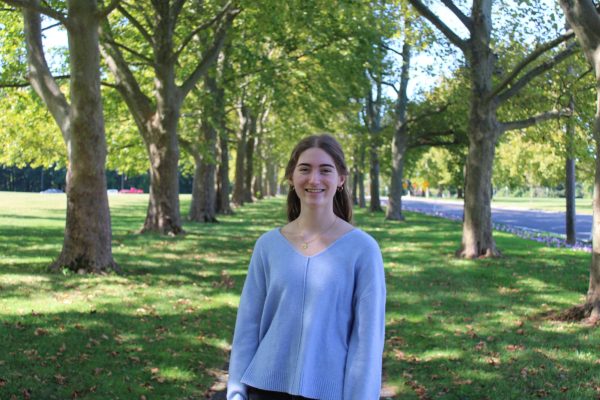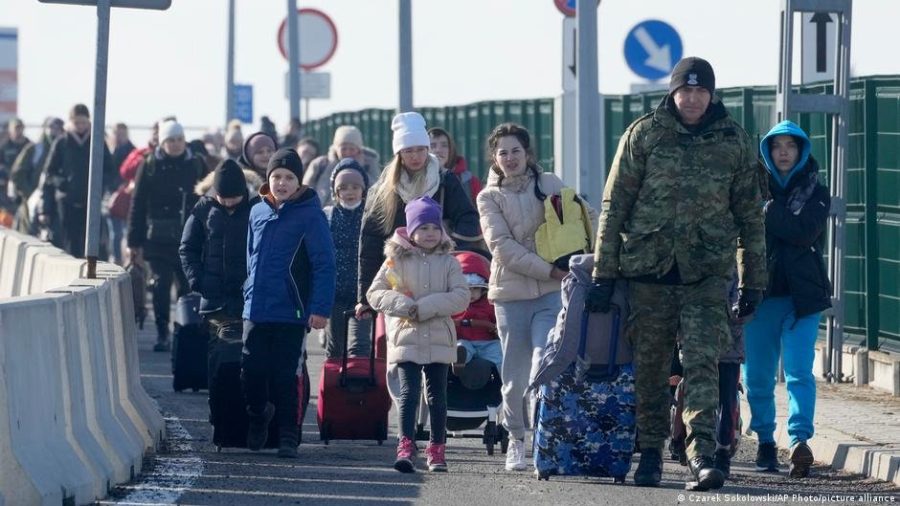Ukraine conflict proves devastating for teenagers
Czarek Sokotowski, Photo-Alliance
Russia’s attacks on Ukraine are estimated to have killed over 3,200 Ukrainian citizens and displaced ten million more.
As you read this article, combat in Ukraine uproots the lives of children and teenagers no older than those in Southern Lehigh High School. Since February 24th, 2022, when President Vladimir Putin of the Russian Federation announced intent to undergo a “special operation” in the region, the United Nations estimates that the conflict has killed at least 3,238 Ukrainian civilians and displaced ten million more.
Of this number, the Prosecutor General’s Office of Ukraine writes that 220 children had been killed and 407 injured. These numbers are the most recent available at the time of publication, May 4th.
Many of these fatalities result from explosive devices in populous areas, according to World Vision, yet similar danger confronts the ten million displaced Ukranians. The United Nations Children’s Fund is credited with saying that a Ukrainian child becomes a refugee every second. Of the ten million, recent totals reveal that only about 3 million have found refuge in other countries, meaning that many are still within Ukraine itself.
In travel, they are exposed to continued violence from the warring parties, general obstacles such as lack of shelter or basic necessities, risk of abduction and trafficking, and physiological trauma (World Vision). While the physical dangers are certainly considerable, said mental stresses are also quite threatening for children, as their developing minds are especially vulnerable to the constant situational tension.
“Their lives have changed in an instant, and for children, who need routine and familiarity, this has been deeply distressing,” Mihaela Nabăr, national director of World Vision’s Romania office said. “Conflict has severe and long-term impacts on children. It is vitally important for children who have been forced to flee Ukraine to quickly retrieve some kind of routine.”
She continued on to say that safe-spaces have been established for displaced children in the region, by World Vision itself and other organizations. These offer professional counseling services, as well as a playful environment for these refugees to “just be a child with other children who are facing the same situation.”
As for Ukrainian teenagers, Open Democracy has reached out for comments on their thoughts and feelings amid the war. The organization also contacted Russian teenagers and others from neighboring countries, summarizing that each “have written of sadness, anger and anxiety, while those most directly touched by the war have told of their anguish. But they have also written about their hopes for the future.”
“I’m incredibly angry. At Putin; at people who don’t even believe that there is a war,” eighteen-year-old Eva, who shares Ukrainian and Russian ancestry, said on the website. “When people in Ukraine were woken by the sound of sirens in the midst of a national emergency, one New Zealand magazine decided it would be a great choice of words to title their newsletter, ‘Hashtag World War 3 is trending.’ There are countless people around the world on whom this conflict has had no direct impact, yet they have the nerve to claim how ‘tired of living through historical events’ they are.”
Eva also communicated hope for her country, and inspiration at hearing reports of Ukrainian forces fighting for their country while other nations stepped in with aid.
“Despite all this, I also see miracles,” she said. “I see it in people who help, I see soldiers who are protecting their motherland. I want to believe that there will be a consistent effort that will bring about the end of this dark part of history, so we’ll be able to tell our children and grandchildren that the whole world came together and that kindness won over evil.”
Another respondent, whose age and name were not disclosed for safety, originally lived in Russia before moving to Ukraine seven years ago. At the time of their reply, they were volunteering with the fighting forces in defense of Kyiv, the Ukrainian capital. Resultantly, their first-person insight to the war conveyed a somber outlook.
“For these years that I lived in Ukraine, I felt like I had finally found my place in this world. I was happy. On 24 February, my life turned into a total nightmare,” they said. “I saw 18-year-old Russian soldiers who did not even want to be there. They were told that they were going to free people from the ‘Nazis’ or guard the border, when in reality they were on their way to occupy my country. They are crying and surrendering because nobody wants this war. Wherever you are, I want you to know: this war is real and it is happening here, right now.”
Southern Lehigh junior Kylie Baker’s opinion is that, seeing as the situation has escalated into military conflict, America should perform a more active role in confronting it.
“The actions Russia has taken in Ukraine are, by definition, war crimes and genocidal,” she said. “America’s actions thus far are encouraging Ukraine’s success, but most sanctions are not directly impacting the Kremlin and instead the general Russian population that’s been manipulated by their government. We as a nation should be doing more direct actions against Russia’s media networks and providing support and aid to the Ukrainian community as well as opening our refugee program.”
Senior Quinn Doyle also feels that more support should be offered, though she believes that the role should not fall on any single country.
“I think [the situation in Ukraine is] obviously extremely devastating, and I don’t think it’s getting nearly enough attention as it should be,” she said. “I feel that few people understand how significant it truly is, considering that Russia is dropping bombs on Ukrainian schools and hospitals. … I don’t necessarily think that the United States should be doing something, but I think that NATO should. Clearly, Ukraine deserves assistance in this crisis.”
Junior Boris Litvak communicated similar thoughts.
“The situation in Ukraine is very sad and concerning,” he said. “You always wish to resolve issues through diplomacy, not military conflict.”
Sophomore Andrew Lapko, a student with Ukrainian ancestry of his own, agreed that the ongoing conflict is tragically uncalled for.
“Ukraine has constantly fought for its independence from Russia and the Soviet Union until 1991 when they finally became an independent country,” he said. “The fact that they have to fight to keep their independence is unfair for a country that just wants peace.”

Alexis Behrens has been an enthusiastic member of the Spotlight since the very beginning of her time at Southern Lehigh High School. As a freshman, she...


